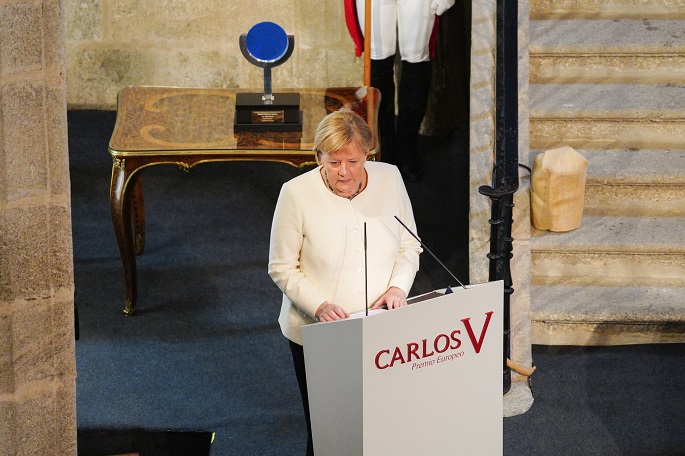COVID measures not sufficient as hospitals sound alarm: Merkel
Published : 23 Nov 2021, 01:31
Acting German Chancellor Angela Merkel said on Monday that the country is not doing enough to tackle a rising wave of coronavirus infections, as medical professionals warned that hospitals were already struggling in some regions.
"We have a highly dramatic situation. The measures currently in place are not sufficient," Merkel said, according to sources from a party leadership meeting in Berlin.
"We have a situation that surpasses anything we've seen before," she was quoted as saying.
In her view, current restrictions on unvaccinated people will not be enough to stem the spread of the virus.
Merkel pointed to the number of new cases, which is doubling every 12 days in the country.
Despite the urgency of the situation, Merkel's government has held back from taking any drastic action due to the fact that it is acting in a caretaker role since elections in September.
Her conservatives lost the election, and their Social Democrat partners are currently negotiating to launch a new coalition with the Greens and the FDP.
On Monday, Merkel's spokesman said the outgoing coalition would not be making a decision on whether to make vaccination mandatory in Germany - a hugely contentious subject and something that Merkel and other politicians had repeatedly ruled out.
Meanwhile, a leading intensive care professional warned on Monday that the situation in German hospitals was worsening.
"The coronavirus situation is very worryingly and currently not under control," said Gernot Marx, president of the DIVI industry body.
Over 3,670 Covid-19 patients are currently receiving intensive care in Germany, almost 1,200 of whom were admitted in the last week.
The states of Bavaria, Thuringia and Saxony are already suffering from acute difficulties, meaning that patients are having to be transferred and scheduled operations postponed.
In Saxony, Germany's hardest-hit state in the fourth wave of infections, the state medical association said that hospitals were already preparing triage measures, meaning they will prioritize.
Association head Erik Bodendieck told the Deutschlandfunk broadcaster that in a matter of days two patients will "have to fight for one bed."
German political leaders have been urging the population to get vaccinated. As of Monday, 68 per cent of Germans were fully vaccinated.
German politicians have also sought to even the scales by promoting all vaccines on offer, as demand for the Pfizer/BioNTech drug in particular surged amid a call for people to get booster jabs.
Speaking at a press conference in Berlin, acting Health Minister Jens Spahn promoted Moderna, which he called a "good, safe and very effective vaccine."
In a letter sent to the states, Spahn's federal ministry announced a limit on order quantities for the BioNTech vaccine in the coming weeks. Moderna is to be used more frequently for booster vaccinations because the nation's stocks of that drug are set to expire in the first quarter of next year.
Currently, BioNTech accounts for over 90 per cent of orders.
"There is enough vaccine for all upcoming vaccinations. And both vaccines work," Spahn stressed.
Michael Kretschmer, premier of the eastern state of Saxony, called for an pragmatic approach to vaccinating.
"Every vaccine we have is a blessing. And we should use every vaccine, no matter which one it is that is approved," he said in Berlin on Monday.
"This is not about which one we like better," Kretschmer added. "You're supposed to grab it with enthusiasm, that's the main thing."
Saxony has a seven-day incidence of 960.7 infections per 100,000 residents, Germany's disease control institute reported on Monday.
By comparison, the nationwide seven-day incidence stood at 386.5 per 100,000, the Robert Koch Institute (RKI) said. That is another new record for the country.
The rate was up from 372.7 the day before, and 303.0 a week ago, confirming the rapid spread of Covid-19.
Health officials said there were 30,643 new cases within the past day, a significant increase on one week ago, when 23,607 new infections were reported.
Monday's infection figures bring the total in Germany to 5,385,585, although officials believe the actual total to be significantly higher as many cases go unrecognized.
The data showed that 62 people had died of Covid-19 within the past 24 hours, up from 43 a week ago. The latest figure brings the national death toll to 99,124.


